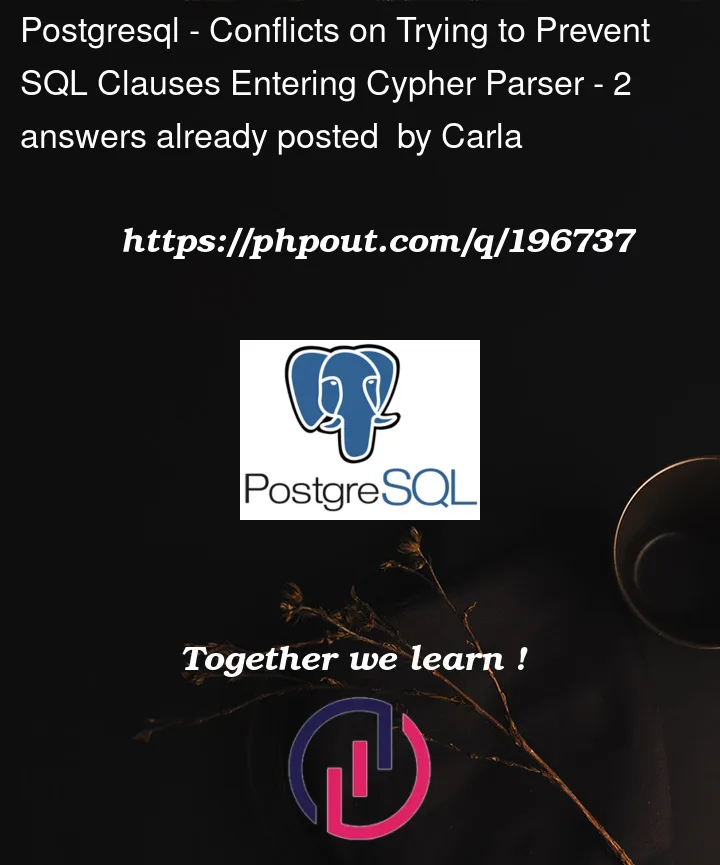I am working on a project to add support for Cypher queries on psql to Apache AGE. Currently, to create a graph with Apache AGE, we need to specify a Cypher query inside the SQL query. For example:
SELECT * FROM cypher('graph_name', $$
MATCH (v)
RETURN v
$$) as (v agtype);
With the new support, we only need to specify MATCH (v) RETURN v; to generate the same result. To achieve this, we implemented the HandleCypherCmds function in the psql mainloop.c file, specifically in the PSCAN_SEMICOLON condition.
Here is the relevant code:
/*
* Send command if semicolon found, or if end of line and we're in
* single-line mode.
*/
if (scan_result == PSCAN_SEMICOLON ||
(scan_result == PSCAN_EOL && pset.singleline))
{
/*
* Save line in history. We use history_buf to accumulate
* multi-line queries into a single history entry. Note that
* history accumulation works on input lines, so it doesn't
* matter whether the query will be ignored due to if.
*/
if (pset.cur_cmd_interactive && !line_saved_in_history)
{
pg_append_history(line, history_buf);
pg_send_history(history_buf);
line_saved_in_history = true;
}
/* execute query unless we're in an inactive if branch */
if (conditional_active(cond_stack))
{
/* handle cypher match command */
if (pg_strncasecmp(query_buf->data, "MATCH", 5) == 0 ||
pg_strncasecmp(query_buf->data, "OPTIONAL", 8) == 0 ||
pg_strncasecmp(query_buf->data, "EXPLAIN", 7) == 0 ||
pg_strncasecmp(query_buf->data, "CREATE", 6) == 0)
{
cypherCmdStatus = HandleCypherCmds(scan_state,
cond_stack,
query_buf,
previous_buf);
success = cypherCmdStatus != PSQL_CMD_ERROR;
if (cypherCmdStatus == PSQL_CMD_SEND)
{
//char *qry = convert_to_psql_command(query_buf->data);
success = SendQuery(convert_to_psql_command(query_buf->data));
}
}
else
success = SendQuery(query_buf->data);
slashCmdStatus = success ? PSQL_CMD_SEND : PSQL_CMD_ERROR;
pset.stmt_lineno = 1;
/* transfer query to previous_buf by pointer-swapping */
{
PQExpBuffer swap_buf = previous_buf;
previous_buf = query_buf;
query_buf = swap_buf;
}
resetPQExpBuffer(query_buf);
added_nl_pos = -1;
/* we need not do psql_scan_reset() here */
}
else
{
/* if interactive, warn about non-executed query */
if (pset.cur_cmd_interactive)
pg_log_error("query ignored; use \endif or Ctrl-C to exit current \if block");
/* fake an OK result for purposes of loop checks */
success = true;
slashCmdStatus = PSQL_CMD_SEND;
pset.stmt_lineno = 1;
/* note that query_buf doesn't change state */
}
}
Currently, the code implements temporary constraints to prevent SQL clauses from entering the Cypher parser, as doing so generates syntax errors. However, maintaining these constraints is not practical because they only work if the user correctly writes the Cypher clause. I tried working with the parser variables, but it needs to enter the Cypher parser to work, resulting in the same errors.
I have been unable to find a solution to this problem. Could someone please assist me in implementing this feature?




2
Answers
One approach that comes to mind is Pre-processing the query.
You can try to perform a pre-processing step such that instead of sending the whole query to the cypher parser, you can try and separate out SQL parts and Cypher parts using regular expressions or some custom function.
Try first introducing a logic to detect if the query is a cypher query and if so, separate it from the SQL part of the code and pass both separately.